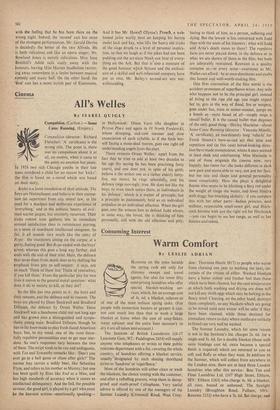Cinema
All's Welles
By ISABEL QUIG•LY Compulsion. (Carlton.) — Some Came Running. (Empire.) Kicks is a loose translation of their attitude. The boys are Nietzscheans, and believe in their exemp- tion (as supermen) from any moral law; in the need for a deadpan and deliberate experience of `everything,' and in the esthetic beauty of evil : Mad scarlet jargon, but sinisterly recurrent. Their kicks consist (one gathers) less in immediate sensual satisfaction than in reminiscent purring, in a sense of inordinate intellectual smugness. So far, it all sounds Very much like the story of Rope: the murderers sitting on the corpse at a party, feeling good. But Rope ended with the boys' arrest, whereas this goes a long way farther, and ends with the end of their trial. Here, the defence that saves them from death does so by shifting the emphasis from pity to self-respect : it says, not so niuch 'Think of them' but `Think of yourselves, if you kill them.' From the particular pity for two lives it moves to the general moral question : what does it do to society to kill, as they did?
So.the film has two points to it : the boys and their reasons, and the defence and its reasons. The boys are played by Dean Stockwell and Bradford Dillman, the defence by Orson Welles. Dean Stockwell was a handsome child star not long ago and has grown into a distinguished and sympa- thetic young men; Bradford Dillman, though he has so far been made to play fresh-faced American boys, has, to my mind, one of the most force- fully repulsive personalities ever to get near star- dom. So one's responses vary between the two of them. The script tends to be coy and ambiguous, with Tea and Sympathy remarks like : `Don't you ever go to a ball game or chase after girls?' The nastier boy carries a teddy bear, like Sebastian Flyte, and refers to his mother as Mumsy; but one has been spoilt by films like End as a Man, and has high standards of accuracy when it comes to intellectual delinquency. And the foil, the possible saviour, the good girl, is played by a girl who must be the heaviest actress—emotionally speaking— in Hollywood : Diane. Varsi (the daughter in Peyton Place and again in 10 North Frederick), whose drooping, sick-cow manner and slow enunciation of each syllable, as if she finds her- self facing a stone-deaf moron, puts one right off understanding angels from the start.
There remains Orson Welles : apart from the fact that he tries to add at least two decades to his age (by saying he has been • practising forty years), and one does not, in spite of his girth, believe it (he strikes one as a rather elderly forty- five, not more), he• rings splendidly, and his defence rings movingly, true. He does not like the boys, or even much notice them, as individuals in his defence : which is a matter of principle, but a principle as passionately held as an individual prejudice or an individual affection. When the girl goes into the witness box to defend Judd whom, in some way, she loved, she is thinking of him personally, still with the old affection and .pity; hating to think of him, as a person, suffering and dying. But the lawyer is less concerned with Judd than with the souls of his listeners : what will Judd and Artie's death mean to them? The repulsive facts are never played down, in the defence or in what we are shown of them in the film; but both are admirably restrained. Restraint is a quality someone as—in every sense—enormous as Mr. Welles can afford : he at once dominates and exalts this honest and well-worth-making film.
One firm convention of the film world is the accident-proneness of superfluous wives. Any wife who happens not to be the .principal girl, instead of living to the • ripe old age you might expect her to, gets in the way of flood, fire or tempest, goes under bus, train Or motor-scooter, jumps on a bomb or—most banal of all—simply stops a casual bullet. It is the 'casual bullet that disposes of the only good thing—Shirley. Maclaine—about Some Came Running (director : Vincente Minelli; 'A' certificate), an inordinately long 'vehicle' for Frank Sinatra's hero-as-cad act that time and repetition and (in this case) bored-looking direc- tion have made monotonous, where it once seemed at least sleek and entertaining. Miss Maclaine is one of those originals the cinema now, very happily, has room for; she looks different in each new part and seems able to vary, not just her face, but her size and shape and general personality most remarkably. Here she plays a delightful floosie who seems to be blushing a fiery red under the weight of rouge she wears, and loves Sinatra with doggy but touching idolatry : if you compare this with her other parts—Indian princess, neat milliner, respectable small-town girl, and Hitch- cock heroine with just the right wit for Hitchcock —you can begin to see her range, as well as her hounce and talent.






































 Previous page
Previous page